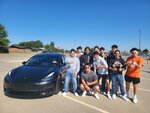


Modern technology has granted humanity with the gifts of convenience and conservation with the likes of tools such as social media, microtransactions, and one of the most controversial inventions: electric vehicles (EVs).
Victor Atayde, Ulysses High School (UHS) Auto Mechanics Instructor, sought out the opportunity for his students to become cultivated in the advancements of the automotive industry.
Atayde conducted a demonstration Thursday, August 31, with a 2014 Nissan Leaf, provided by Pineda Auto Sales. Presentations and test drives were made available by the Alternative Power Class to enlighten the community of the new age way of transportation.
UHS Alternative Power student Juan Rico provided several details about the reliability and functions of the Nissan Leaf. Interestingly, electric vehicles forego the traditional mechanics of an engine and transmission, solely relying on battery life. One of the key factors in owning an electric vehicle is the availability of charging stations.
“There is a misconception that you’re sacrificing something with an EV,” said Atayde. “But this is just another economic car with a/c and power steering. You just have to charge it.”
Although Atayde provided his students with an EV to study, a local owner stopped by to share his experience. Upon hearing about the Alternative Power Class’s demonstration, Tanner Perez drove his Tesla model EV to the Maxwell Field parking lot for a teaching opportunity.
Atayde shared details on Perez’s experience, including the unspoken courtesy rules regarding charging stations. For EV owners, parking at the same charging station is frowned upon.
“When two people use the same station, it takes longer for each vehicle to charge because they are using the same source,” explained Atayde.
Perez’s engagement with UHS students presented a lesson in manufacturing and quality differences. For instance, between the Nissan Leaf and Tesla models, the charging ports require minutes to hours to reach full capacity.
Afford-ability is debatable due to the different routes a potential buyer has to acquire an alternative powered vehicle.
Atayde explained the retail cost of a Nissan Leaf ranges from $3,000 to $40,000, depending on whether it is used or new.
Battery life plays the biggest role in getting the best bang for your buck. Since battery life decreases over time, a newer model may sell for less if the battery life provides less traveling range than an older model with a better battery life.
Ultimately, Atayde and his students found the 2014 Nissan Leaf to be an affordable alternative for commuting within city limits. Perez’s Tesla model would be more ideal for lengthier travel since the vehicle can reach approximately 280 miles on a fully charged battery.
In the future, Atayde hopes to find more local EV owners to provide further education to Auto Mechanics students at UHS.
“These kids who are going to be mechanics and technicians, this is just something else they’ll have to learn in school,” said Atayde. “I’m hoping to give these kids a bit of a head start.”
Comments
No comments on this item Please log in to comment by clicking here